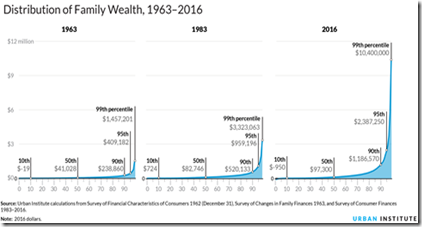Answering the Kennedys Call—Part II
New York Times’ economic writer Neil Irwin in a recent Op-ed is not seeing a very robust future for global economic growth. “…what the last few months have made clear is that the forces that have held back the global economy for the last 11 years are not temporary, and have not gone away…The low-growth world was not just a phase. It’s the new reality beneath every macroeconomic question and debate for the foreseeable future.”
Really? Much of such pessimistic forecasting is based on a faulty understanding of economic history. I am paraphrasing the title of a controversial and little noticed 2011 New York Times Op-ed by Rutger’s history professor James Livingston, at a time when recovery from the Great Recession was still in doubt.
In it, he said, “As an economic historian who has been studying American capitalism for 35 years, I’m going to let you in on the best-kept secret of the last century: private investment — that is, using business profits to increase productivity and output — doesn’t actually drive economic growth. Consumer debt and government spending do. Private investment isn’t even necessary to promote growth.”
And yet most Americans still apparently buy the conservatives’ line that lower corporate and personal income taxes generate more jobs and growth, which hasn’t panned out for the latest Republican reduction in personal and corporate tax rates, either.
“Between 1900 and 2000,” wrote Professor Livingston, “real gross domestic product per capita (the output of goods and services per person) grew more than 600 percent. Meanwhile, net business investment declined 70 percent as a share of G.D.P. What’s more, in 1900 almost all investment came from the private sector — from companies, not from government — whereas in 2000, most investment was either from government spending (out of tax revenues) or “residential investment,” which means consumer spending on housing, rather than business expenditure on plants, equipment and labor.”
And that is why we have congresswoman Alexandria Octavio-Cortez’s call for a 70 percent maximum income tax rate and Presidential candidate Senator Elizabeth Warren’s just announced proposal for a wealth tax on the richest Americans with accumulated net wealth of more than $50 million.
“Warren herself hasn’t issued many details of her plan,” said the LA Times on her announcement, “But according to UC Berkeley economists Emmanuel Saez and Gabriel Zucman, who advised her on the proposal, the tax would be 2 percent on net worth above $50 million and another 1 percent on net worth above $1 billion. They say it would affect about 75,000 U.S. households, or less than 0.1 percent of the total, and raise $2.75 trillion over 10 years. That’s about 0.1 percent of gross domestic product per year.”
American conservatives have worked to lower taxes on the wealthiest, while enhancing the monopoly powers of corporations since at least 1980. It has resulted in the greatest income and wealth inequality in U.S. modern history, as illustrated by this Urban Institute graph.
The result has not been good for a participatory democracy, as I said last week. But returning $2.75 trillion to federal government coffers over 10 years would be good for democracy, whether it can be put to use to implement more social programs like paid family leave, some form of private/public universal health care program, at least $1 trillion in repairs and upgrades of our ageing infrastructure, more education spending on preschoolers, and paying down some of the outstanding $1 trillion in student debt.
All of these items would vastly improve economic growth, both today and for future generations. So there is no need to believe Neil Irwin’s lament that the world can’t escape its “low growth, low inflation rut.”
We have not been paying attention to economic history, but condemned to repeat what hasn’t worked, says Professor Livingston.
“So corporate profits do not drive economic growth — they’re just restless sums of surplus capital, ready to flood speculative markets at home and abroad. In the 1920s, they inflated the stock market bubble, and then caused the Great Crash. Since the Reagan revolution, these superfluous profits have fed corporate mergers and takeovers, driven the dot-com craze, financed the “shadow banking” system of hedge funds and securitized investment vehicles, fueled monetary meltdowns in every hemisphere and inflated the housing bubble.”
That’s why it’s time to begin to put some of America’s accumulated wealth to better use than has been the case in recent decades.
Harlan Green © 2019
Follow Harlan Green on Twitter: https://twitter.com/HarlanGreen

